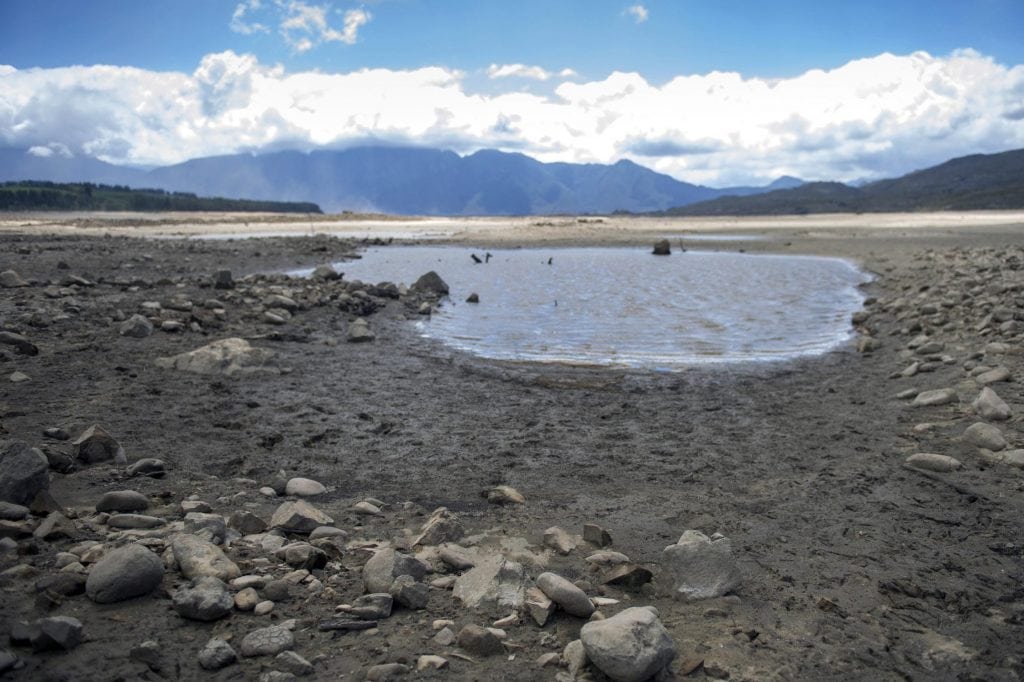Skift Take
In less than 100 days, Cape Town may run out of water. While the impact on the city’s crucial tourism industry has been limited thus far, that could soon change.
 Editor’s Note: Gateway is a Skift series featuring first-hand, original stories from our correspondents embedded in cities around the world. The logo reflects where the correspondent is based and not necessarily the article’s focus. Read about the series here.
Editor’s Note: Gateway is a Skift series featuring first-hand, original stories from our correspondents embedded in cities around the world. The logo reflects where the correspondent is based and not necessarily the article’s focus. Read about the series here.
South Africa’s Western Cape province, of which Cape Town is the provincial capital, is in the grips of the worst drought in a century. Below-average rains have seen the dams dry up, and despite increasingly draconian water restrictions, the city is now facing the prospect of what has been dubbed, somewhat apocalyptically, Day Zero: the day the taps run dry. In less than 100 days, Cape Town faces the unenviable accolade of becoming the first major city in the world to simply run out of water.
It’s a nightmare scenario that dominates conversation across the city, and has made headlines in Time, The Guardian and The New York Times. It’s also a looming reality set to have an enormous impact on the city’s all-important tourism industry. Cape Town receives over three million visitors per year, supporting hundreds of thousands of jobs and pumping more than $3 billion into the local economy.
In a bid to stave off Day Zero — expected on April 12 — and reassure guests that all will be well, tourism businesses in the city have been quick to step up to the water-saving plate, with strategies both blunt and ingenious.
In many city hotels, bath plugs have been removed, timers installed in showers, swimming pools closed, and steam rooms shut down. At Hotel Verde, alongside Cape Town International Airport, guests receive a discount for not using a glass or ice when ordering a drink. Local authorities have also provided thousands of water-saving showerheads to guesthouses and Airbnb hosts across the province.
While infrastructure is easy to change, the biggest challenge has been educating visitors and influencing their behavior.
“It has become our mission to ensure that all visitors, international and domestic, are made aware that we have a water shortage,” said Enver Duminy, CEO of Cape Town Tourism, which launched its Save Like A Local campaign late last year.
Part of the campaign sees local musicians recording two-minute songs, “a fun way for locals and visitors to time themselves while in the shower,” said Duminy.
And it seems to be working, with visitors largely taking the changes in their stride.
“We have found that guests are very willing to participate in our efforts because they see it as taking positive action towards the environment,” says Joanne Selby, general manager at The Table Bay Hotel in the popular V&A Waterfront precinct. The hotel has installed gray water systems for flushing toilets and watering gardens, and adapted their housekeeping schedules to reduce demand in the water-hungry laundry.
While visitor numbers for the recent peak summer season seem little changed, there is certainly a risk of reputational damage if the taps run dry.
A useful bellwether is the domestic tourism market, which has already seen a shift.
“We have seen a spike in visitation in other areas of the country that [are] not experiencing a drought,” said Melville Saayman, a professor and tourism industry expert at South Africa’s North-West University. “As the water restrictions become more and more severe, awareness may increase, mainly due to social media. That could affect the international traveler’s travel patterns as well. … It will also most certainly have a negative impact on South Africa’s image as a destination.”
While local authorities and tourism businesses work to stave off the dreaded Day Zero, for the moment the city’s iconic beaches and colourful restaurants still throng with tourists.
“Cape Town is open for business,” said Jeff Rosenberg, provincial chairperson for the Federated Hospitality Association of South Africa. “We encourage people to visit our beautiful city, but to be mindful of the crisis we’re facing and be prepared to save like a local.”
The Daily Newsletter
Our daily coverage of the global travel industry. Written by editors and analysts from across Skift’s brands.
Have a confidential tip for Skift? Get in touch
Tags: africa, destination marketing, drought, gateway
Photo credit: Cape Town's main water supply from the Theewaterskloof dam outside is pictured on Jan. 23, 2018. A severe drought may force the city to turn off most of its taps. Associated Press
